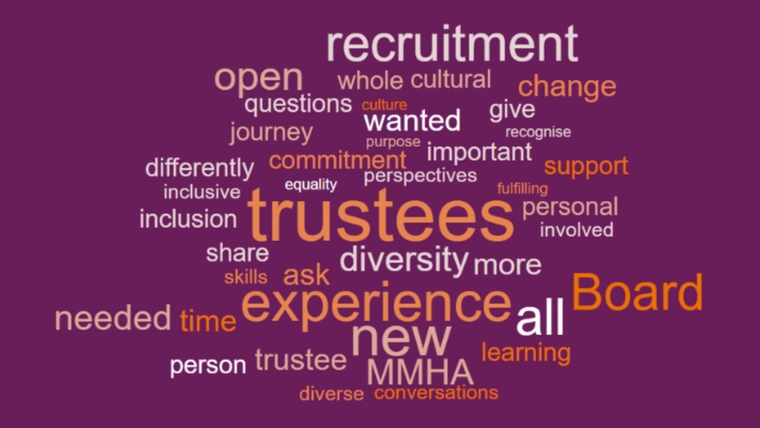Posted By: Nikki Wilson
11th July 2022
5 minute read

What we do is more important than what we say, or what we say we believe.
Bell Hooks, 2014
The Maternal Mental Health Alliance (MMHA) Board has recently recruited three new trustees. This has brought us to what will be many milestones in our journey to ensure equity, diversity and inclusion are at the heart of everything we do.
We set out from the start to do this recruitment very differently and, in this blog, we want to share what we have learned along the way.
If the past two years have taught us anything, it is just because we think we are ‘good people’ in the charity sector we must not assume that we are a truly diverse organisation. We started our intentional equality, diversity and inclusion (EDI) journey with an explicit commitment by the whole board and staff team to look deeply at ourselves and our purpose. With early help from an external consultant, Letesia Gibson of New Ways, who provided a space for staff and trustees to reflect on our own values and experience and plan for becoming an anti-racist organisation. The trustees and the staff are now on the path to evolving how we do things and recognise that we need to make small incremental changes as well as some big ones.
Firstly, we knew we needed greater diversity on the Board and decided to recruit three new trustees to really expand the balance of voices around the table. We wanted to go beyond visible representation to change the future of the MMHA. EDI does not start and end with recruitment, but it was an important place to affect cultural change at the MMHA.
From previous experience, we knew we had to do things differently. As a group of white trustees, we couldn’t do it alone. Our first step was to bring in two advisers from the MMHA network of members and lived experience champions and to consult the excellent online advice that was available. We couldn’t have done it without them!
We want to share our approach and observations because of the deep learning experienced by all of us involved:
We began by being clear about why we needed trustees from different backgrounds. Our recruitment pack opened with an acknowledgement of the stark inequalities experienced by women and families during pregnancy and after birth, influenced by social, economic and cultural factors.
We were explicit in giving opportunities to people who had not previously been a trustee or been in leadership roles before. We wanted to open the door as wide as possible and we knew we had enough experience on the Board to support new trustees that join.
We had brilliant advice co-opted from our members and champions and drew on the guidance already available in the sector, making sure our language reflected social and cultural awareness and inclusivity.
What we will give our new trustees is as, if not more, important than what they will bring to the MMHA. Our pack set out what we are offering, which was the theme of the whole recruitment process, including buddying, training, and learning events.
We knew we needed Black, Asian, and younger mothers to join our Board, but we also needed to fill the gaps we had identified in our skills audit, including bringing trustees on board with the experience of working in:
We did not ask for a CV. If someone was interested in becoming a trustee, we wanted to know what they were like, to tell us their story, their motivation, and what matters most to them.
We took time to think through every part of the process to ensure it was as open and inclusive as possible and set out each step of the process, so applicants knew what to expect. Inevitably, we had to change things as not everything worked out as we originally planned.
Surely the most off-putting part of applying for any post is the interview. Why does the panel always ask questions? We turned this around and asked the applicants to ask us the questions. We set out the four themes we wanted to cover beforehand and asked them to come with questions to ask us.
No presentation, no interview by a panel.
What great conversations we had between us all! We learnt so much more about each person. Each of the discussions with the 8 applicants was fascinating. Moreover, the panel had to do some deep thinking about the role of being a trustee and the process generated lots of new ideas for us. It worked having the conversations both online and in person.
As much as we took a flexible and open approach so did the applicants and they participated fully in the process with open minds and helpful feedback.
With regard to the recruitment process, I thought the recruitment pack was fantastic – very informative and helpful. The interview on the day was one of the most inspiring I’ve been involved in. You all made me feel at ease and I very much appreciated that.
Applicant
In particular:
It was a privilege to take part in this different way of trustee recruitment and we all agree we will adopt this same process again. Our learning headlines are:
Our experience shines a light on how vital continuous listening, hearing, and trying to do better is. Getting it right once is just that and we can’t stop here; this is about ongoing commitment. We are in no doubt that our three fantastic new trustees will help us all to change how we “do governance” and ultimately foster an organisational culture of diversity and inclusion, which is what this journey is all about.
Kate Billingham, Vice Chair
Christel Hawkins, Trustee and Chair of Governance Sub-Committee
Laura Seebohm, CEO